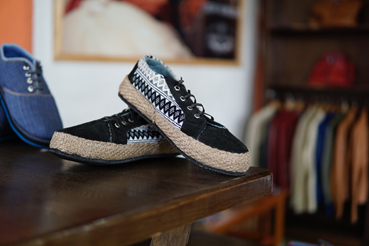Fair Anita operates as a social enterprise, which is, put simply, a business with a mission. It’s not a non-profit, in that it doesn’t rely on donors or financial support outside of its own business. However, it is unique from normal companies as it is driven by the goal of maximizing its social impact to improve the well being of people while operating a self sustaining for-profit business. There are lots of ways a business like this can be run, with different products and different missions. Fair Anita specially operates “to create opportunities for women and girls, selling trendy (and affordable!) fair trade products made by over 8,000 talented yet marginalized women in 16 countries.”
During the most recent artisan group visit to Ethiopia, we had the incredible experience of visiting several Ethiopian based social enterprises, all in support of and employing local artisans.

 Sole Rebels
Sole Rebels
The first social enterprise we visited was an organization called “Sole Rebels.” They create handcrafted shoes out of hand loomed fabric, inner tube laces, recycled tire soles, and hand spun cotton out of their workshop in Addis Ababa, Ethiopia. They aim to create prosperity and opportunities for workers in their community while leveraging the artisan skill and natural materials of their nation. Additionally, Sole Rebels is proud to be the 1st WFTO Fair Trade footwear company on the planet. We had a lot of fun visiting one of their retail stories in their home city, trying the shoes on, and speaking with the store managers.
 Sabahar
Sabahar
The second organization we visited was a textile company called Sabahar, founded to preserve and showcase weaving traditions in Ethiopia while providing respectful and ethical work opportunities. They sell beautiful scarves, shawls, table linens, cushions, throws, and towels made from start to finish with Ethiopian natural fibers. We got to see their beautiful products in their shop while also seeing the production process from the spinning of the thread to the weavers in action.
Fair Anita Artisan Partner #1
Fair Anita’s first artisan partner in Ethiopia is comprised of an incredible partnership between a non-profit and a social enterprise. The non-profit branch of the company is fueled by the mission of providing hope and empowerment to women who have been prostituted. They have a year long program that consists of six months of counseling and then six months of job training, from which the women then transition into full time work relating to the skills they have learned (different routes being housekeeping, food prep, hair salon, tailoring, and artisan work). They provide childcare support on site, teach the women how to open up a checking and savings account, and provide this program for 20 women at a time. Additionally, they have recently launched a prevention program centered around education at local schools and churches. The social enterprise branch employs women from the artisan route of training with all profit of the business flowing back to support and grow the non-profit branch. The women create beautiful jewelry out of melted down bullet casings, as well as beautiful hand woven scarves. Fair Anita partners with them on design and is one of their largest buyers for their jewelry. The more Fair Anita can order from them and sell in the U.S., the more business this organization has (and subsequent ability to employ more women), which makes it even more exciting to have lots of new designs ordered and planned for the next three seasons!
Fair Anita Artisan Partner #2
“From Bullets to Beautiful” is a tagline used by Fair Anita’s second artisan partner. This phrase is representative of both the product they create, as well as the mentality of the women employed. Their business is centered around jewelry made out of melted down bullet casings, taking something associated with violence and pain and transforming it into something intricate, dainty, and beautiful. A similar transformation is adopted by the women employed. Each artisan comes from a past associated with hardship, but they have all truly turned their lives around and now are working jobs that allow them to effectively support themselves and their families. Each woman has been diagnosed with HIV/AIDS, and as a result of the stigma and lack of education on the diseases, are often forced to leave their families and communities once diagnosed. While this is their past, their present involves being talented artisans who are exceptionally skilled at their trade. The business operates with over 110 women employed, and they are divided into different skill levels, from beginner to advanced. They recently opened up a gallery in Addis Ababa that showcases their jewelry, as well as a number of similar social enterprises across the country (including leather, soap, candles, and pottery). All in all, it was incredible to meet and spend time with this powerful organization!

